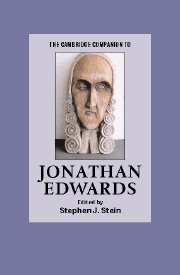Book contents
1 - Biography
from Part I - Edwards’s life and context
Published online by Cambridge University Press: 28 November 2007
Summary
If we are to appreciate Jonathan Edwards as a real person and not just as an intellectual or spiritual prodigy who appears out of nowhere in the American wilderness, we must try to get a sense of his contexts. Edwards lived in a time and place very different from our own, and so it takes some acts of imagination to get a good sense of him in his own times.
First, we must think of when Edwards lived. Born in 1703 and living until 1758, he came of age almost a full century after the first American Puritan settlements; but he died before there was an inkling of the American Revolution. Even most educated Americans today would be hard pressed to name anything that happened in colonial America between 1703 and 1758, except perhaps the awakening with which Edwards himself was associated and the outbreak of the French and Indian War during Edwards's last years. They might also recall that Benjamin Franklin, born in 1706, was a contemporary of Edwards and thus provides us with some secular glimpses of these largely unknown decades.
Our picture of Edwards's world is helped considerably if we think about Europe during his time. One of the most momentous developments was the intellectual revolution of the Enlightenment, which was growing throughout Edwards's lifetime. Edwards's early thought was shaped by the great English figures of the previous generation, Isaac Newton and John Locke, and he was a contemporary of the Scottish David Hume, whose work he knew well. Edwards's intellectual context was shaped by a host of British and European thinkers who were shepherding Christendom from an age of intense faiths and religious wars into what they hoped would be an age of reason, science, and common sense. Benjamin Franklin's secular outlook is a testimony to the appeal that these impressively formulated British and European Enlightenment views often had for young colonials.
- Type
- Chapter
- Information
- The Cambridge Companion to Jonathan Edwards , pp. 19 - 38Publisher: Cambridge University PressPrint publication year: 2006
- 1
- Cited by



